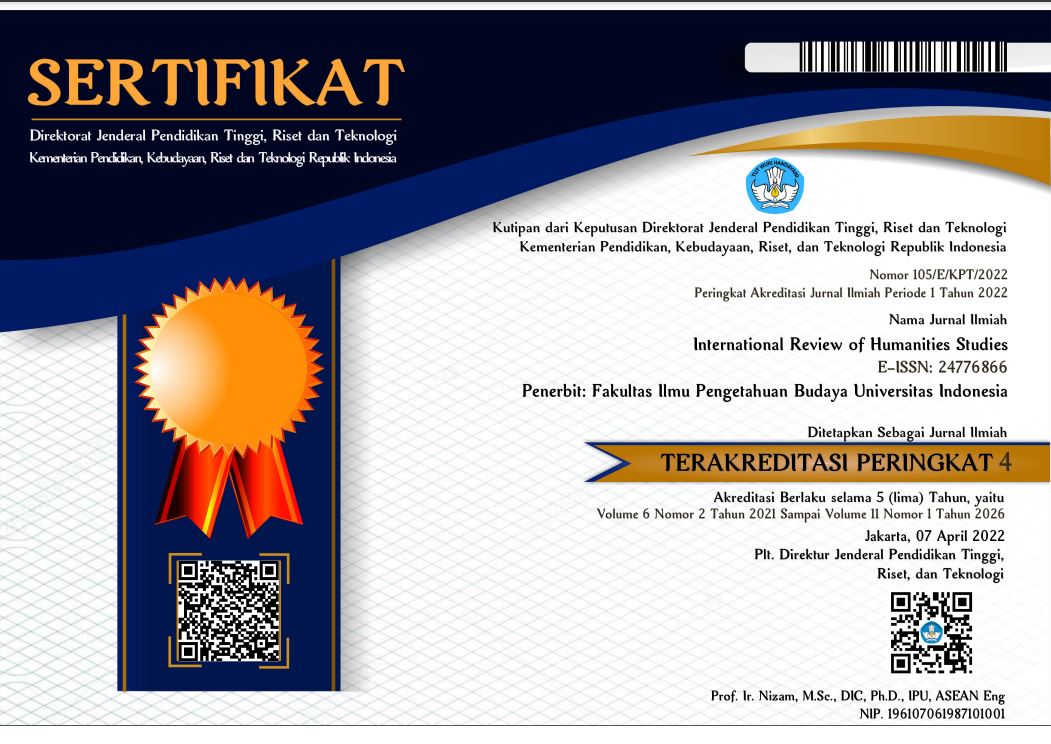International Review of Humanities Studies

Abstract
This research analyzes the discrimination against migrants returning to their homeland. The discrimination occurs because migrants are considered to have no sense of shared fortune and solidarity when the condition of the country was unstable. The government efforts to recall them to return to the country are not often responded well by the local community. They tend to discriminate and reject the existence of migrants who return as brothers. It represents in the movie Hwanghae (2010) by the director Na Hong Jin as a corpus. Thus, this research uses discrimination theory to analyze research problems a ethnic identity theory to analyze the consequences of research problems. This research uses literature review in collecting the data and critical discourse analysis as a method in analyzing the problem. The discrimination against Joseonjok has consequences for the idea of their ethnic identity as part of Korean ethnicity. In general, ethnic identity is correlated with blood relations, but the discrimination experienced by these migrants makes their ethnic identity disguised.
References
Braziel, J.E & Mannur, A. (2003) Theorizing diaspora: a reader. Manhattan: Blackwell Publishing.
Conner, Walker. (1986) The Impact of Homelands Upon Diasporas. London: Croom Helm
Bauböck dan Faist. (2010) Diaspora and transnationalism. Amsterdam: Amsterdam University Press.
Brah, Avtar. (1996) Cartographies of Diaspora: Contesting Indentities. London: Routledge
Hujuala Rika, Ayu. (2012). Identitas Diaspora Perempuan India dalam Cerita Pendek Wanita Amerika-India. Jurnal Sastra. Vol. 9 No. 2 September.
Han, G, (2007). Multicultural Korea: Celebration or Challenge of Multi Ethnic Shift in Contemporary Korea. Seoul: Korean Journal
Ji-Yeon Yuh. (2005).Moved by war: Migration, Diaspora, and The Korean War. Journal of Asian American Studies. Vol. 8 No. 3 October
Yoon, I.. (2012). Migration and the korean diaspora: a comparative description of five cases. journal od ethic and migration studies. 38(3). 413-435
Fang, G. (2010).A comparative analysis the meaning of model minority among ethnic koreans in china and the united States. Vol.46, No.2. pp 207-222
Jang dan Kang.(2017). Civic and political engagement of korean chinese (Joseonjok) in korea: vase of activist. Vol.48, No.2. pp. 325-359
Ki, K. (2001).Affliction and opportunity: Korean literature in diaspora, A brief overview. Vol.25, No.2. pp 261-276
Kim, J. “Writers transcend diaspora” Korean Literature Now. Volume 23 Autumn. 2014. 34-35
Lee, Y.(2017). National heterogenity and transnational linkage to homeland: The case of korea migrants in china. Vol. 48, No.1. pp 152-182
Lin Y. “Pride as an ethnic korean in china” Korean Literature Now. Volume 23 Autumn. 2014. 48
Park, J. “Exploring the dimensions of the korean diaspora” Korean Literature Now. Volume 23 Autumn. 2014. 3
Sanchez, M.(2019). Ethnic and Cultural Homogeneity: An Obstacle for Development? Boston: Northeastern University
Skrentny dan Seol.(2009). Ethnic return migration and hierarchical nationhood. Vol.9, No.2 pp. 147-174
Song, C.(2014). Identity politics and the meaning of “Homeland” among korean migrants in south korea. Vol.43, No.4. pp. 441-479
Yuwanto.(2013). Politics of National Identity: Comparative Analysis on Indonesia and South Korea. Semarang: Politika Jurnal Ilmu Politik
Recommended Citation
Fatimazzahroh, Syifa and Latifah, Eva
(2023)
"DISCRIMINATION AGAINST JOSEONJOK IN HWANGHAE MOVIE,"
International Review of Humanities Studies: Vol. 8:
No.
1, Article 3.
DOI: 10.7454/irhs.v8i1.1002
Available at:
https://scholarhub.ui.ac.id/irhs/vol8/iss1/3


